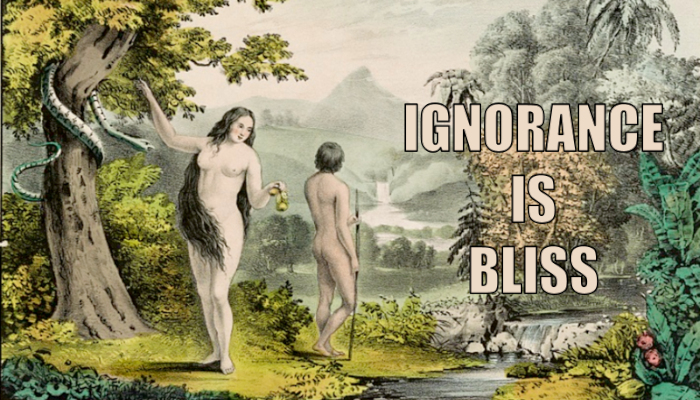
The sixth post in a series on metaphor
Life is a crazy, mixed-up ball of contradictions that we’re forced understand as we navigate through it. Luckily, we have metaphor as a tool to explain the human condition’s incongruities. For example, let’s take a look at the metaphor Ignorance is bliss.
Merriam-Webster has this to say about each word:
- Ignorance: “a lack of knowledge, understanding, or education.” Synonyms include: cluelessness, innocence, and obliviousness
- Bliss: “complete happiness” with synonyms such as heaven and paradise.
At first glance, it looks like they have nothing in common. But when you add the human experience, we begin to see a close relationship that we’ve told stories about for centuries. The Old Testament described how a bite of fruit from the tree of knowledge altered Adam and Eve’s Garden of Eden bliss into one of danger and shame. Siddhartha Gautama meditated under a Bodhi tree (tree of enlightenment) and emerged as the Buddha: the enlightened one, who awoke from a perpetual sleep-walk through life. Both stories are built upon the metaphor: ignorance is bliss.
The first post of this series described how metaphors transfer properties from the word to the right of “is” (bliss) to the word on the left (ignorance). In doing so, the metaphor attempts to connect happiness with a lack of knowledge. Before eating the forbidden fruit, Adam and Eve experienced a false sense of security. But, just because one feels safe, one isn’t protected from danger.
So why eat from the tree of knowledge? Why meditate under the tree of enlightenment? The answer is found in the antonym to ignorance: knowledge.
If ignorance is bliss, then knowledge is power.
In other words, ignorance is weakness in a world where survival requires strength.
Photo Credit: N. Currier. Adam and Eve in the Garden of Eden. , 1848. [New York: N. Currier] Photograph. https://www.loc.gov/item/90708415/.